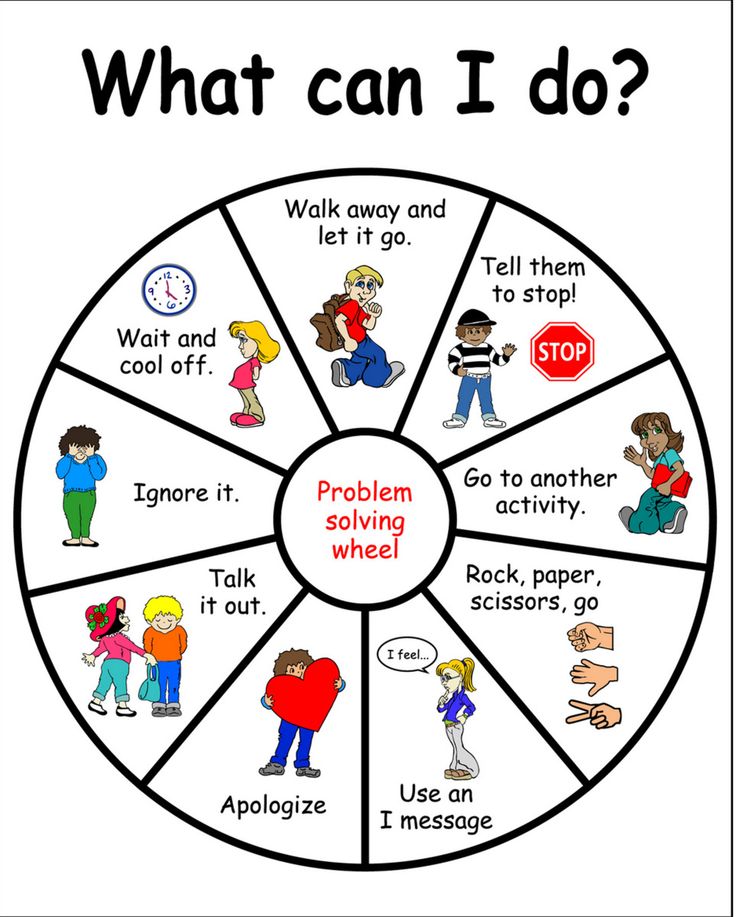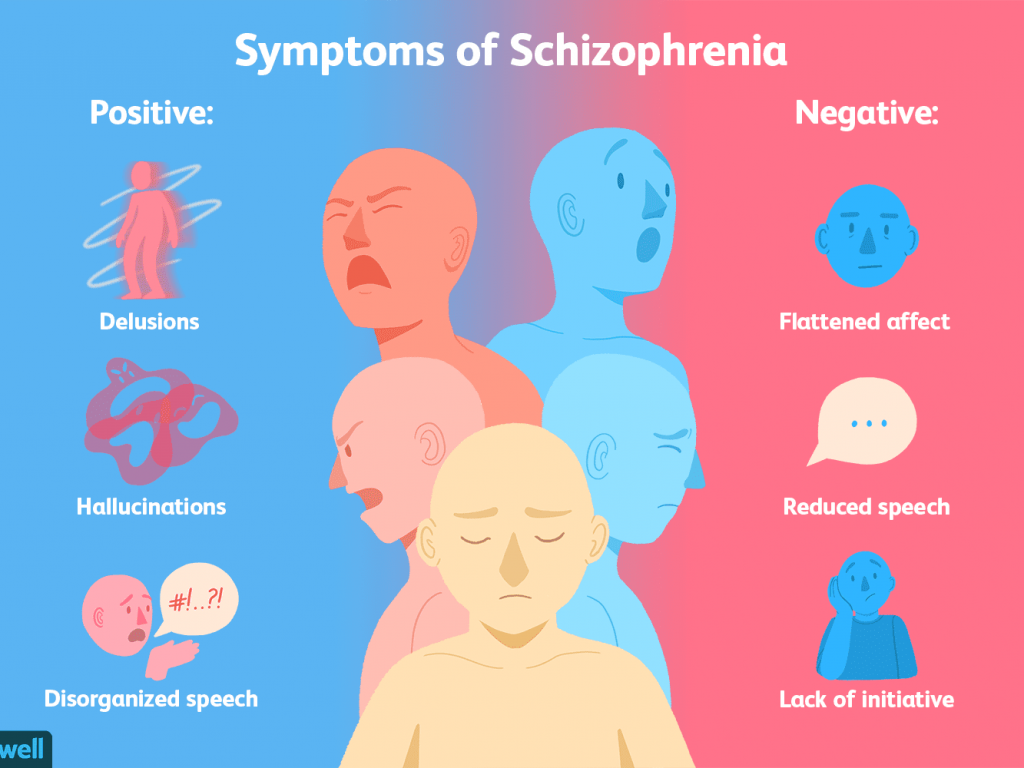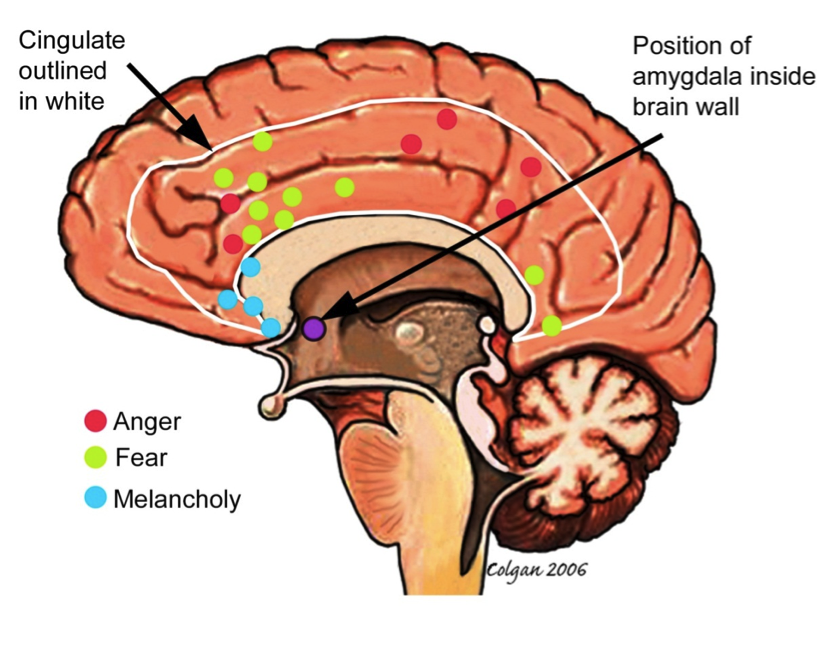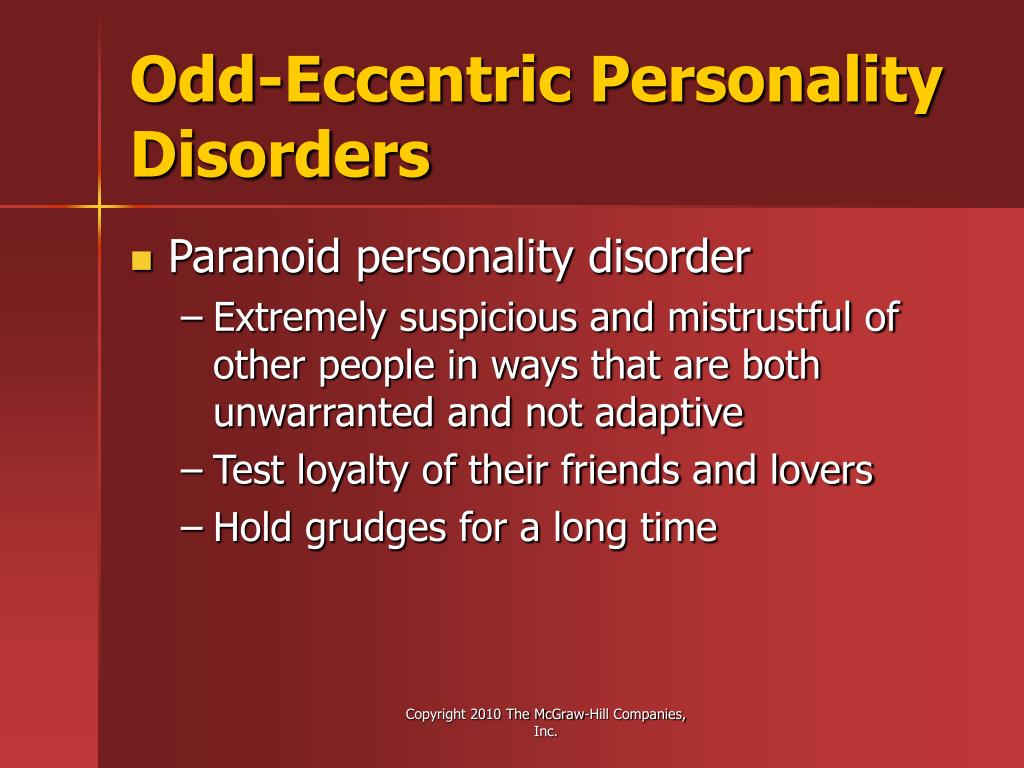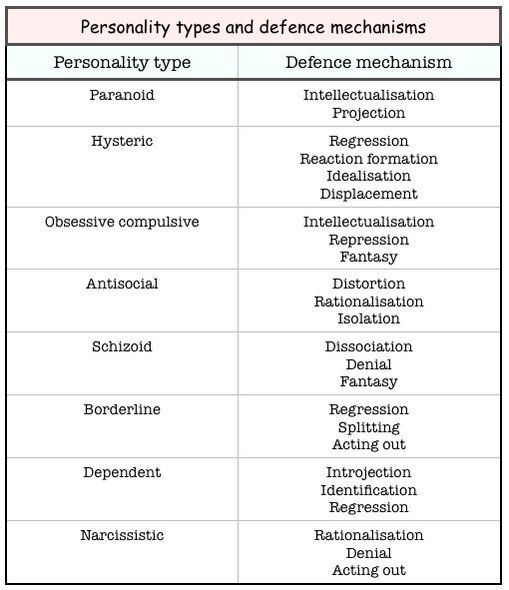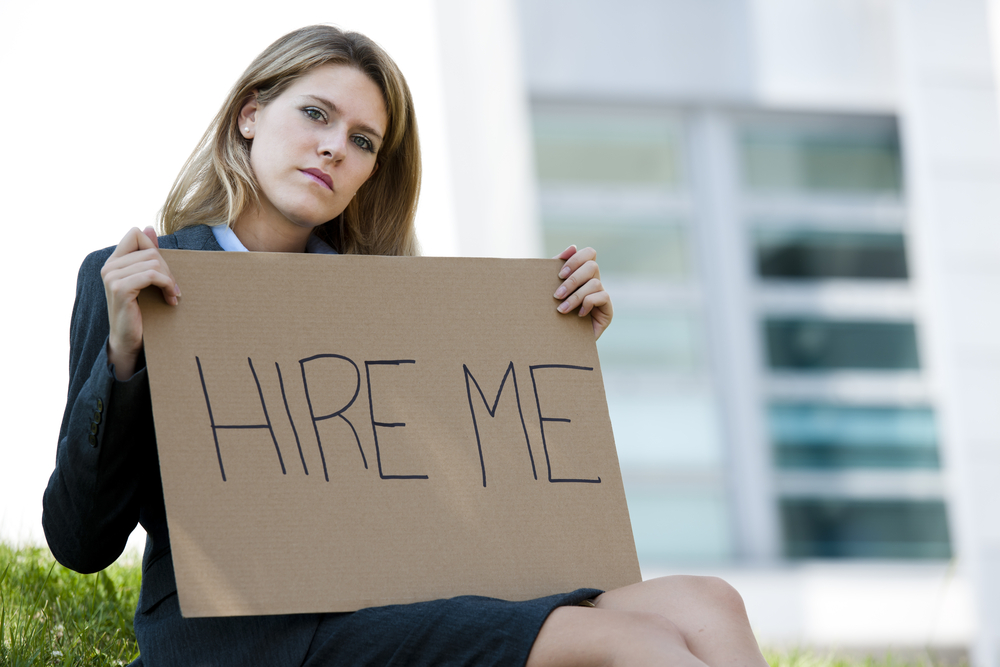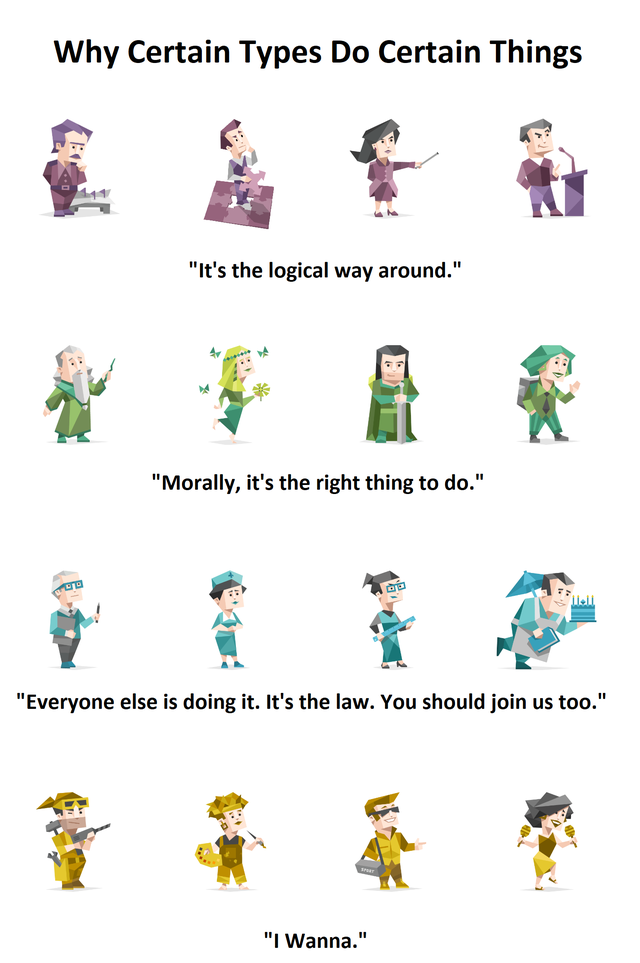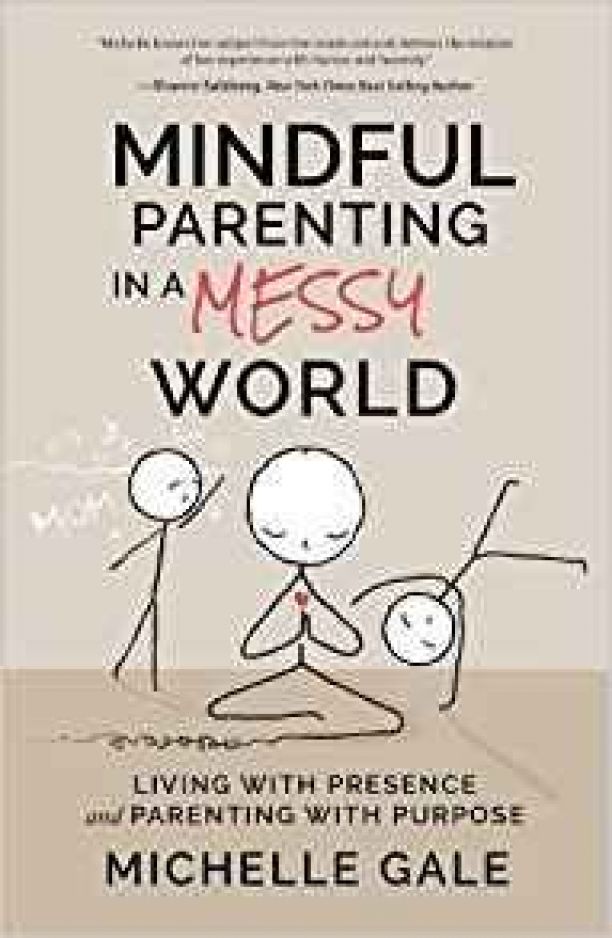Stop feeling anxious now
How to Ease Your Anxiety
Everyone feels anxious from time to time. Occasional anxiety is a normal reaction to uncertainty about what’s going to happen next, whether that’s in the next few minutes, days, or months.
Mental health experts define anxiety as worry over a threat that’s still in your future. Thinking about a conversation you dread, for example, could twist your stomach into knots days before it happens. Your heart may race before an exam or presentation. You might lie awake at night worried about whether you’ll catch COVID-19 at the grocery store.
It’s also normal to want to get rid of those uncomfortable, pit-of-the-stomach feelings as quickly as possible. But that approach can make you more anxious, says David H. Rosmarin, PhD, associate professor of psychology at Harvard Medical School in Boston.
“When you worry about getting rid of your anxiety, you’re signaling your nervous system that you have even more to be anxious about. And that makes your anxiety worse,” he says.
Keep in mind that if your anxiety is long-lasting and interferes with your daily life, you could have an anxiety disorder. In that case, you may need treatment to overcome it.
Calm Anxiety by Accepting It
It’s not what people expect to hear. But one of the most effective ways to ease occasional anxiety is to accept it, says Rosmarin, who is also founder of the Center for Anxiety in New York City.
“When we let anxiety run its course in the moment without fighting it, ironically, that makes it less. On the other hand, fighting anxiety is what typically [triggers] a panic attack,” he says.
“And, if your only strategy is to distract yourself from your anxiety or to avoid things that cause it, you’ll always be afraid of it. It’s always going to be the bully in the schoolyard because you’ve never learned to deal with it.”
The Anxiety and Depression Association of America puts it this way: “The thoughts you resist persist.”
Try these steps instead:
Recognize and understand your anxiety: Tell yourself, “My nervous system is kicking into high gear because I’m worried about [thing X].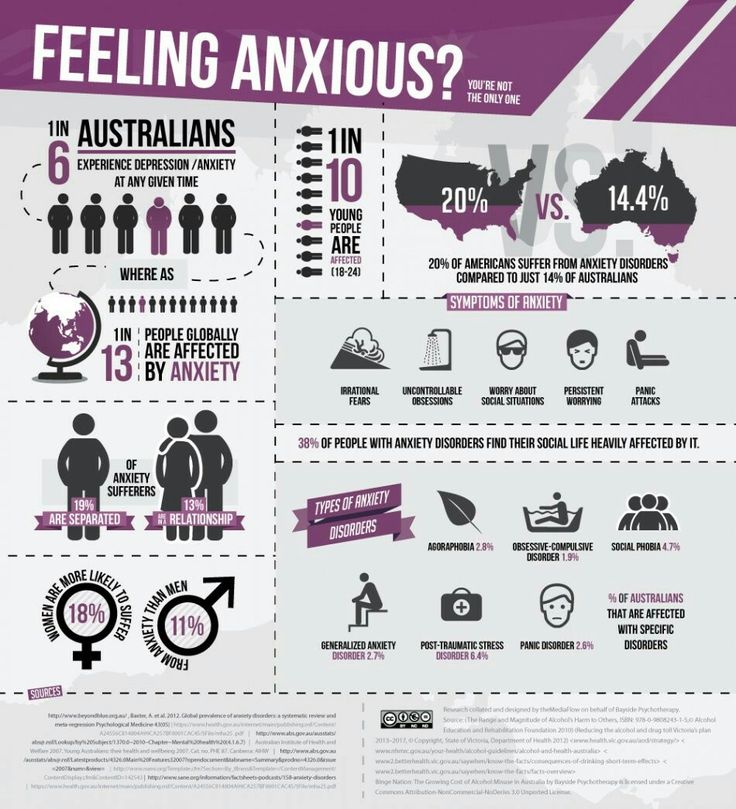 ”
”
Don’t criticize yourself for those feelings: Instead, say, “This is a normal, healthy response by my body to these circumstances, which are complicated, stressful, or difficult. It’s OK to feel this way.”
Know that you can have anxiety and still function well: “You can perform very well with anxiety, and probably have done so before,” Rosmarin says.
Think back to a time when you were anxious but did what you needed to do anyway. Maybe you were filled with anxiety before an event or a meeting. But later, someone said you did a great job.
How to Stop Anxiety
When your anxiety feels overwhelming, these techniques can give you quick, short-term relief.
Do a reality check: Ask yourself these questions:
- On scale of 1 to 100, how likely is it that the thing I’m anxious about will happen?
- Do I have good reasons to think something will go wrong?
- Is there a chance I’m overly worried?
Share your anxiety with someone you trust: Don’t avoid your anxious thoughts, which can make them worse. Talk them over with a friend or family member, who can help you put them in perspective.
Talk them over with a friend or family member, who can help you put them in perspective.
Remind yourself that you’re safe: “When anxiety kicks in you may feel scared or out of control, with your mind racing to all these uncertain future catastrophes,” says clinical psychologist Debra Kissen, PhD, chief executive officer of Light On Anxiety CBT Treatment Centers in the Chicago area.
“Ask yourself, ‘Is there a real danger in front of me, or am I actually safe at home and worried about something that’s no threat to me right now?’” she says. “This thinking can ground you in the moment and reboot your brain and body so you feel less anxious.”
Redirect nervous energy: Anxiety can be like a motor revving, says licensed professional counselor Lisa Henderson. “Take control of that energy and put it somewhere else,” says Henderson, co-founder and chief executive officer of Synchronous Health in Nashville.
“If you’re sitting there worried, for example, get up and walk or pace,” she says.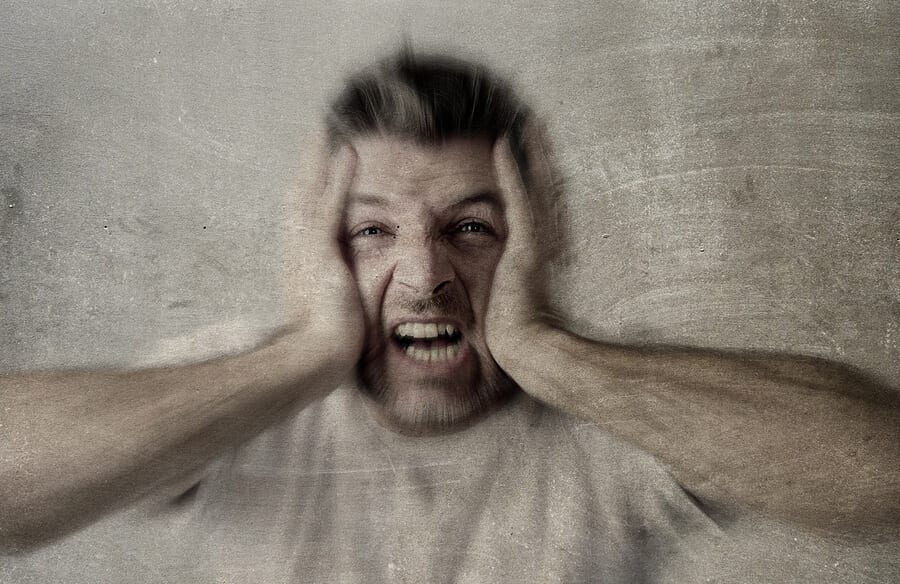 “Take a few minutes to clean something. Go outside for 5 minutes. Shorts bursts of activity can release that anxious energy.”
“Take a few minutes to clean something. Go outside for 5 minutes. Shorts bursts of activity can release that anxious energy.”
Take a mental break: “Use a guided imagery app or simply daydream on your own,” Henderson says. “A brief mental vacation can break the cycle of anxious thoughts.”
To try this on your own, set a timer for a few minutes, close your eyes, and picture yourself somewhere you feel peaceful or happy.
“Just letting your mind wander can work well if your anxiety comes from feeling controlled or managed,” Henderson says. “If your mind returns to its anxious thoughts, notice -- without judgment -- that it’s happened and mentally tell your anxiety ‘I’ll be with you in a moment.’ Then go back to your daydream.”
You may prefer an app that guides you through your thoughts to help you release anxiety. Find relaxation or meditation apps that appeal to you and give them try.
Just breathe: Inhale and exhale slowly, evenly, and deeply for several breaths.
Change your position: “Whatever you’re doing, do the opposite,” Kissen says. “If you’re hunched over with worry, stand up and take a Wonder Woman pose. If you’re under a blanket, go wash your face with cold water. Changing your sensory experience can ‘change the channel’ from anxiety.”
Use a mantra: A mantra can shift your mind away from anxious thoughts that play over and over in your head, Kissen says.
Two she likes are: “These thoughts are uncomfortable, but not dangerous,” and “This, too, will pass.”
Put your anxiety on a schedule: Pick a 15-minute window during the day to think about your anxieties. “During that time, tell your brain to just go for it and let the anxious thoughts come,” Kissen says. “But when they arise outside that time, tell them ‘I’m willing to hear you, but come back tomorrow at 3 p.m.’”
If anxiety keeps you awake, get up: “If you’re lying in bed worrying about things for more than 5 minutes, get up and go to another room and write down your anxieties,” Kissen says. “Go back to bed when you’re tired, but get up again if you feel anxious. It might take a few nights of going back and forth, but this exercise can train your brain that your bed is for sleep, not for anxiety.”
“Go back to bed when you’re tired, but get up again if you feel anxious. It might take a few nights of going back and forth, but this exercise can train your brain that your bed is for sleep, not for anxiety.”
Do I Need Treatment for Anxiety?
There’s a lot you can do on your own to relieve anxiety, but sometimes you need help. Psychotherapy and medication are the two main treatments for anxiety disorders.
Signs that it’s time to talk to a mental health professional include:
- Constant or nearly constant anxiety
- Anxiety that gets in the way of your daily activities, like work or social life
- Anxiety about things that don’t actually threaten you
- Panic attacks
Check your health insurance policy to see what mental health services your plan covers. Then, review a list of your in-network providers to find one to connect with.
“You don’t want to add to your anxiety by paying big out-of-pocket fees,” Kissen says.
Your primary care doctor may also be able to recommend a mental health professional with experience treating anxiety and anxiety disorders.
Rosmarin notes that it’s important to find a provider you click with and trust. He also says therapy doesn’t need to go on indefinitely to be effective.
“A course of cognitive behavioral therapy for anxiety may be eight to 10 sessions,” he says. “There’s also data to suggest that people feel substantially better after just one therapy session for panic disorder.”
How to Calm Down Quickly
Something sets you off, and before long, you feel stuck in an endless loop of intrusive thoughts, pondering every possible thing that could go wrong. Your body tenses, your breathing quickens, and you can hear your heartbeat pounding in your ears.
When you feel anxiety kick in like this, it’s time to calm yourself down. The first step is awareness. It’s a good idea to learn to recognize the first signs of anxiety and get to work right away before experiencing an episode.
Breathe
One of the best things you can do when you start to feel that familiar panicky feeling is to breathe.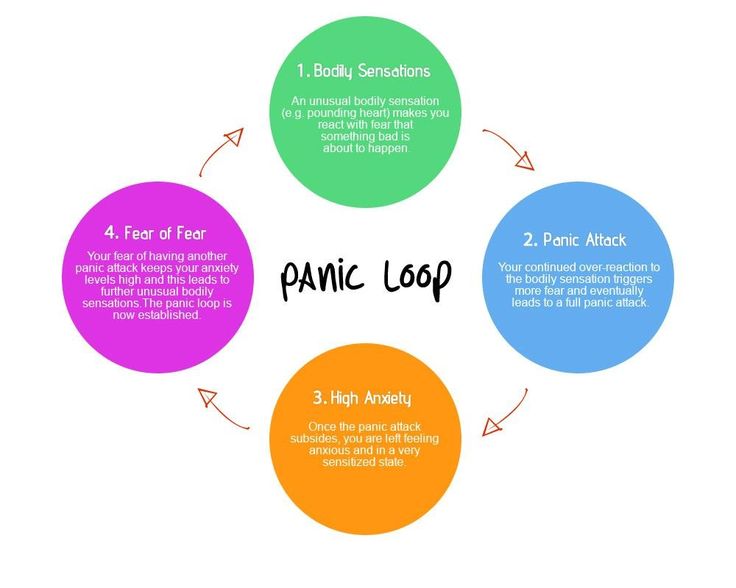 It may sound basic, but basic is great when managing anxiety symptoms.
It may sound basic, but basic is great when managing anxiety symptoms.
Breathing deeply and slowly is key to experiencing the full benefits of it. It’s also a good idea to focus your thoughts on breathing and nothing else.
“When we draw our attention to our breathing and really focus on it, the thoughts that trigger the anxiety start to become more distant, our heart rate slows, and we start to calm,” explains Dawn Straiton, doctor of nursing practice and faculty member of Walden University.
Some people find 4-7-8 breathing particularly effective.
- Breathe in for 4 seconds.
- Hold your breath for 7 seconds.
- Exhale slowly for 8 seconds.
- Repeat until you feel calmer.
Name what you’re feeling
When you’re experiencing an anxious episode, you may not realize what’s going on until you’re really in the thick of it.
Recognizing anxiety for what it is may help you calm down quicker.
“Name that this is anxiety — not reality — and that it will pass,” says Kim Hertz, a psychotherapist at New York Therapy Practice.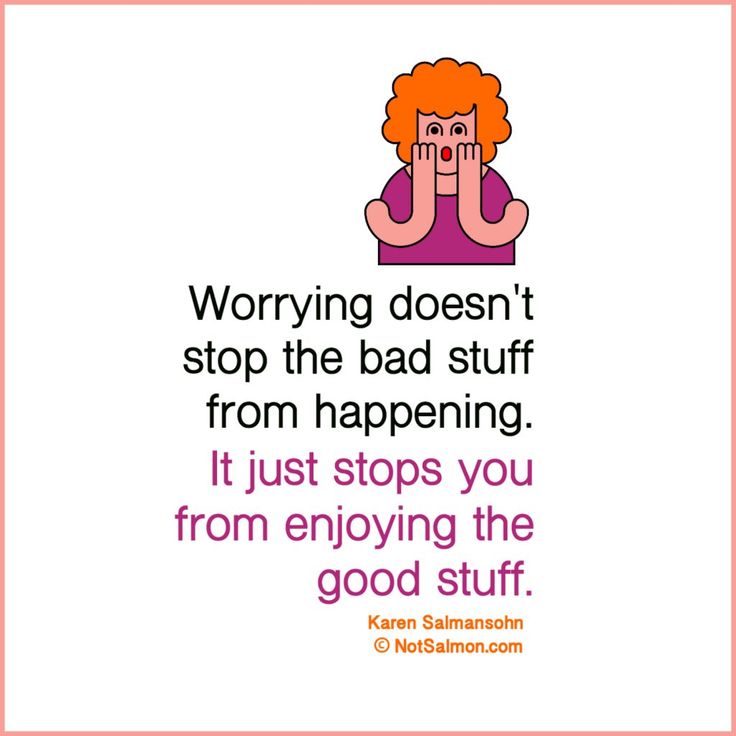 “When you are in a heightened state of anxiety, you want to disrupt that cycle, and for some people, thought-stopping techniques are effective and as simple as saying ‘stop’ to the internalized messaging that heightens anxiety.”
“When you are in a heightened state of anxiety, you want to disrupt that cycle, and for some people, thought-stopping techniques are effective and as simple as saying ‘stop’ to the internalized messaging that heightens anxiety.”
In other words, consider recognizing that what you’re feeling is anxiety and talking yourself through it.
“Embrace absolute truths,” says Steven Sultanoff, clinical psychologist and professor at Pepperdine University. “[Tell yourself] I will get through this — one way or another.”
Naming your sensations and feelings may help you step away from them. This is anxiety, it is not you and it won’t last forever.
Try the 5-4-3-2-1 coping technique
When you’re overwhelmed with anxiety, the 5-4-3-2-1 coping technique could help calm your thoughts down.
Here’s how it works:
- Five. Look around the room, then name five things you see around you. These can be objects, spots on the wall, or a bird flying outside.
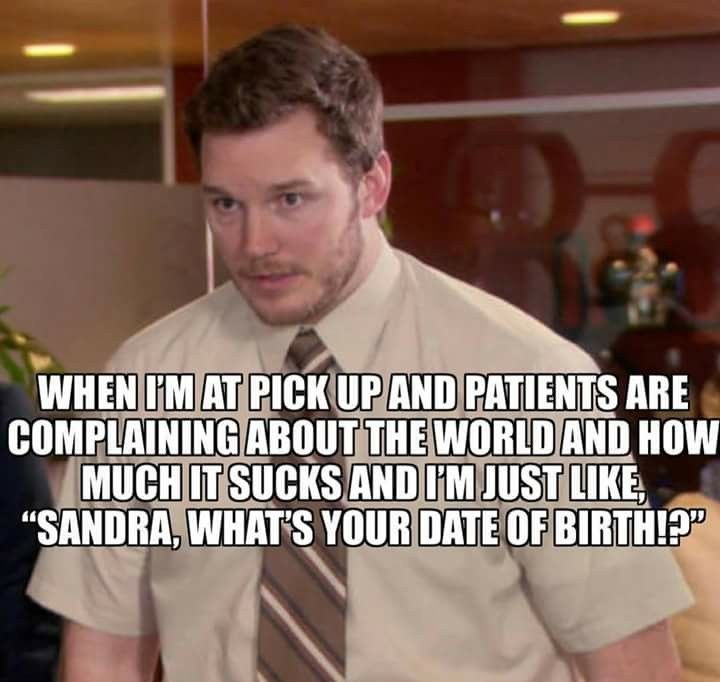 The key is to count down those five things.
The key is to count down those five things. - Four. Next, name fourthings you can touch. This can be the ground beneath your feet, the chair you’re sitting in, or your hair that you run your fingers through.
- Three. Listen quietly, then acknowledge three things you can hear. These can be external sounds, like a fan in the room, or internal sounds, like the sound of your breathing.
- Two. Note two things you can smell. Maybe that’s the perfume you’re wearing or the pencil you’re holding.
- One. Notice something you can taste inside your mouth. Maybe that’s the lipgloss you’re wearing.
This technique works best if you pair it with deep, slow breathing.
Try the “File It” mind exercise
The “File It” technique works particularly well if you’re lying awake at night thinking of all the things you have to do or haven’t done, or if you’re rehashing something that happened during the day.
These are the steps for performing this exercise:
- Close your eyes and imagine a table with file folders and a file cabinet on it.
- Imagine yourself picking up each file and writing down the name of a thought that’s racing through your mind — for example, the fight you had with your spouse, the presentation you have to give tomorrow at work, or the fear you have of getting sick with COVID-19.
- Once the name is on the file, take a moment to acknowledge the thought and how important it is to you. Then, file it away.
- Repeat this process with every thought that pops into your head until you start to feel calmer (or sleepy.)
The idea with this exercise is that you’re taking a moment to name your triggers, examine them, and then consciously put them aside with a deadline to tackle them later. In other words, you’re validating your own feelings and making a plan to deal with them, one by one, when it’s a better time.
Run
“A quick burst of exercise that increases your heart rate is helpful at reducing anxiety,” explains Patricia Celan, a postgraduate psychiatry resident at Dalhousie University in Canada.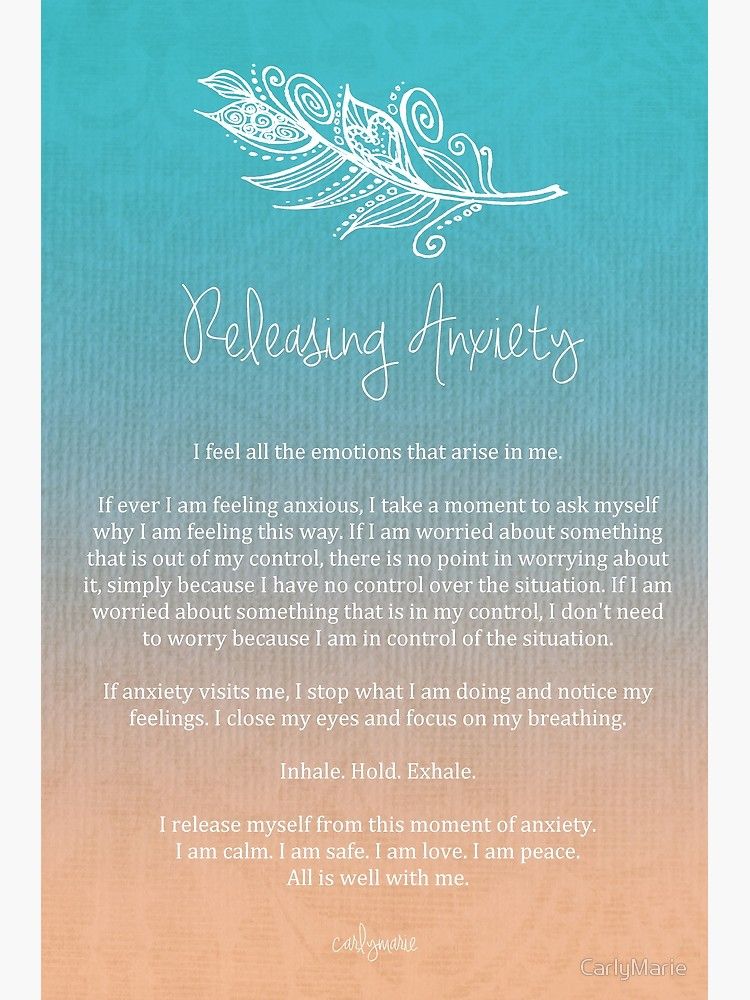
A 5-minute, high-speed run around the block would be enough to help you reduce anxiety quickly, says Celan. Of course, you could run for a longer time if that’s something you enjoy.
If running is not your thing, you could try walking fast for 1 minute and then jogging for 1 minute until you reach 5 minutes total. The key is to increase your heart rate with exercise.
It’s also important not to forget your breathing. While you run, consider focusing on how you’re breathing.
If you live with an anxiety disorder, your amygdala is working overtime. Every time you perceive a threatening trigger, this information is sent to your amygdala. If you have anxiety, you may deal with a lot of triggers. Every time the amygdala senses a threat, it tells the body to fight, flee, or freeze.
This is a natural physiological reaction that allows you to respond to the perceived threat.
If your reaction to this message is to run, you might trick your mind into thinking it’s doing something practical to keep you safe.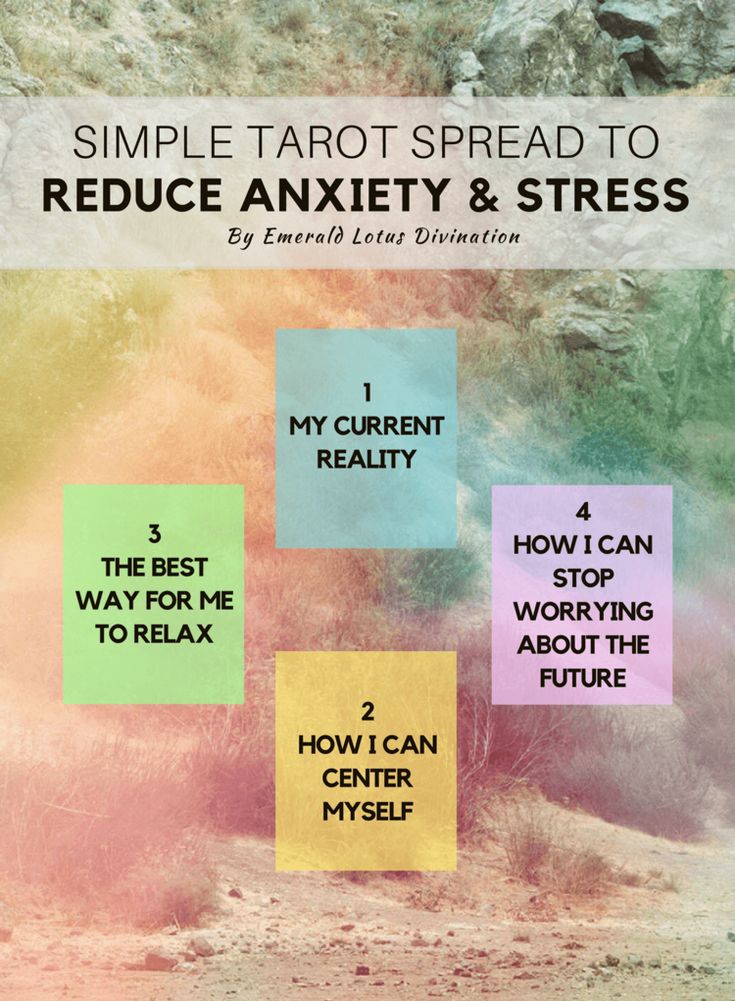 Then, it may lower the state of alert and reduce your anxiety in the moment.
Then, it may lower the state of alert and reduce your anxiety in the moment.
Think about something funny
“Visualize your favorite humorous moments,” says Sultanoff. “One where you laughed so hard you fell down and [nearly] peed your pants. These can be real situations, or they can be situations you saw on sitcoms, in stories, jokes, or cartoons.”
If it’s difficult for you to come up with something in the moment, try picking a couple of memories ahead of time, so you can go to them as soon as you start experiencing anxiety.
Like most mindfulness training, humor visualization takes you out of worrying about things that might happen in the future and focuses you back in your present circumstances, in the “now.”
It does a few other things too. “You experience ‘mirth,’ which is the uplifting reaction to humor,” explains Sultanoff. You feel emotions such as joy, pleasure, or delight — all powerful emotions that can help you reduce anxiety quickly.
And if you’re able to make yourself laugh by remembering that funny moment, he says, humor visualization is even more effective.
“When you laugh, you contract and expand muscles, which reduces physical anxiety, stress, and tension,” he says.
Laughter also combats the production of cortisol levels in the body, he adds.
Distract yourself
If nothing seems to be working to pull your focus from your anxious thoughts, maybe it’s time to find a temporary distraction.
For example, if you’re lying in bed, wide awake, obsessing about what tomorrow will bring and deep breathing and other techniques aren’t working, get up and leave your bedroom and find a distraction in another room.
Focusing on something you really enjoy can break the cycle of anxious thoughts and give you some relief — at least until you’re in a better frame of mind to tackle those thoughts.
What that distraction is, however, varies from person to person. The idea is to find something relaxing, pleasurable, or mindless to pull your focus from your thoughts.
For example, some people find doing the dishes or cleaning their house to be a good distraction.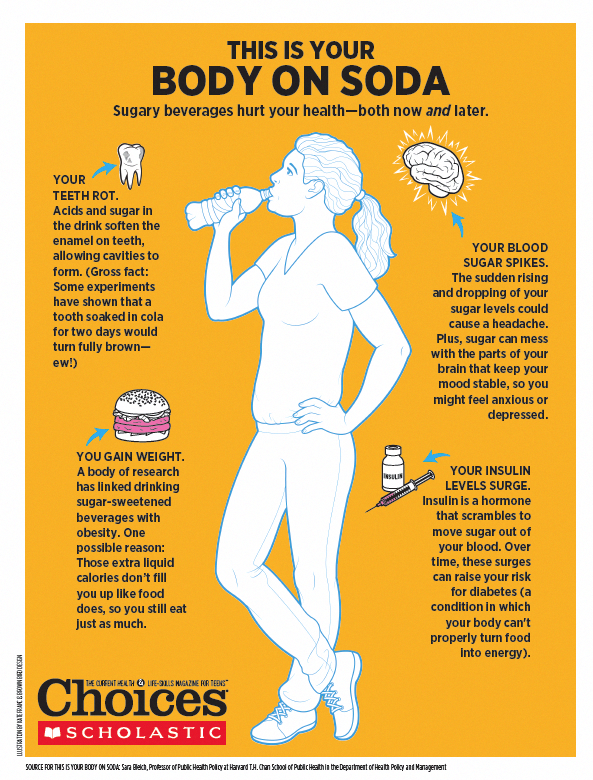 It makes them feel active and requires some focus, but it pulls them away from just sitting there worrying.
It makes them feel active and requires some focus, but it pulls them away from just sitting there worrying.
Other people prefer listening to calming music, watching a favorite TV show or movie (just avoid one that is scary or stressful), reading, painting, or writing.
Sometimes, simply petting your cat or drinking a cup of tea helps. Just make sure you pick a low-stress activity to pull your thoughts away from the source of your anxiety.
Take a cold shower (or an ice plunge)
If you’re experiencing particularly intense anxiety, says Celan, some psychiatrists have a relatively extreme (and unpleasant) way to snap you back to reality: you can fill a large bowl with cold water, throw some ice cubes in, and dunk your face in the water for 30 seconds.
Is it extreme? Yes. But it also works.
“This technique triggers your mammalian dive reflex,” explains Celan. “It tricks your body into thinking you’re swimming, so your heart rate slows, and your body becomes calmer. ”
”
If you don’t feel like doing something this extreme, you can achieve a similar calming effect by jumping in a cold shower or going swimming.
Another option that works, and that some dialectical behavior therapists use, is to place your hand or foot in cold water for a minute or so. You could also hold an ice cube until it melts in your hand.
There are some things you can do to improve your overall mental health and reduce your stress — which might help reduce anxiety symptoms.
Identifying triggers
The best way to do this is to keep a diary. Write down when you feel anxious and what you think caused the anxious episode.
“List these things out to identify what is outside your control and focus on the things that are within your control,” says Straiton.
For example, if you know that social interactions with a specific person tend to trigger your anxiety, make a note of that. Then, consider focusing on these questions:
- What makes me anxious about this situation?
- Are they going to judge me?
- Am I judging them?
- Even if they were judging me, how would that really affect me?
- Would preparing this interaction help me feel less anxious? (e.
 g., what you’re going to say or how you’re going to say it)
g., what you’re going to say or how you’re going to say it)
“When individuals have a plan, they feel ‘in control’ of the perceived future threat that is the trigger of anxiety,” explains Straiton.
Self-care routines
Consider taking a routine that makes time for you to do calming or pleasurable activities.
This can be taking a 30-minute walk or a nightly bath before bed. It can also mean carving out time for meditation, yoga, and your favorite hobbies, whether that’s reading, painting, or doing the Sunday crossword.
It can even mean making time for “play,” such as playing video games, board games, or team sports.
It may be advisable to skip any high-impact exercise within 2 hours of bedtime.
“Play is important to adults too because it gives your brain a break,” says Emily Stone, a marriage and family therapist based in Austin, Texas. “Play helps your brain be more flexible in its thinking, which is important because anxiety promotes rigidity of the brain.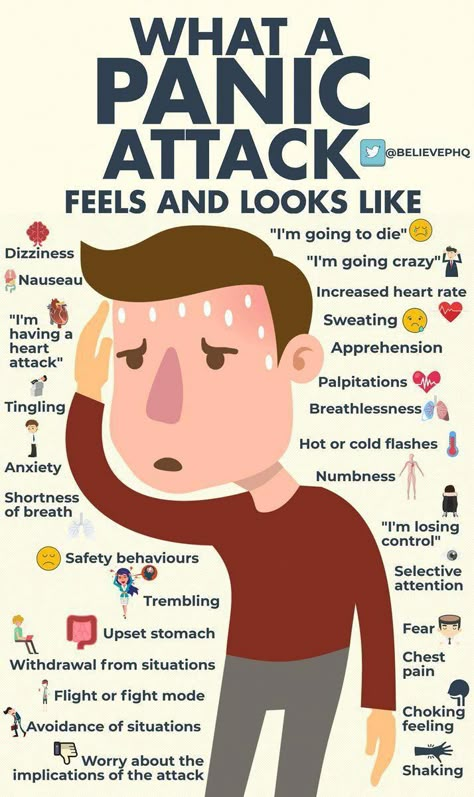 ”
”
She adds, “Play tells your brain and body, ‘Things aren’t so bad. You are safe enough to stop and enjoy life. Your brain and body are listening to what you tell it through your activity. Communicate that life is worth stopping and enjoying.”
Regular exercise
If you live with anxiety, you may feel at times that you don’t have time or energy to go to the gym or out for a walk.
It’s natural to feel this way. However, exercise can do a world of good in reducing anxiety. And, you don’t need a ton of exercise to begin seeing the effects!
“A simple 20-minute daily walk is all that is needed to see a change over time,” says Stone. “It is good for your mind and body. It provides bilateral stimulation to your brain. It gives your mind a chance to go ‘offline,’ and it tells your body that it is safe to relax and enjoy the environment.”
Practice good sleep hygiene
Try to go to sleep and wake up at the same time every day — weekends included.
Your routine before going to bed also matters.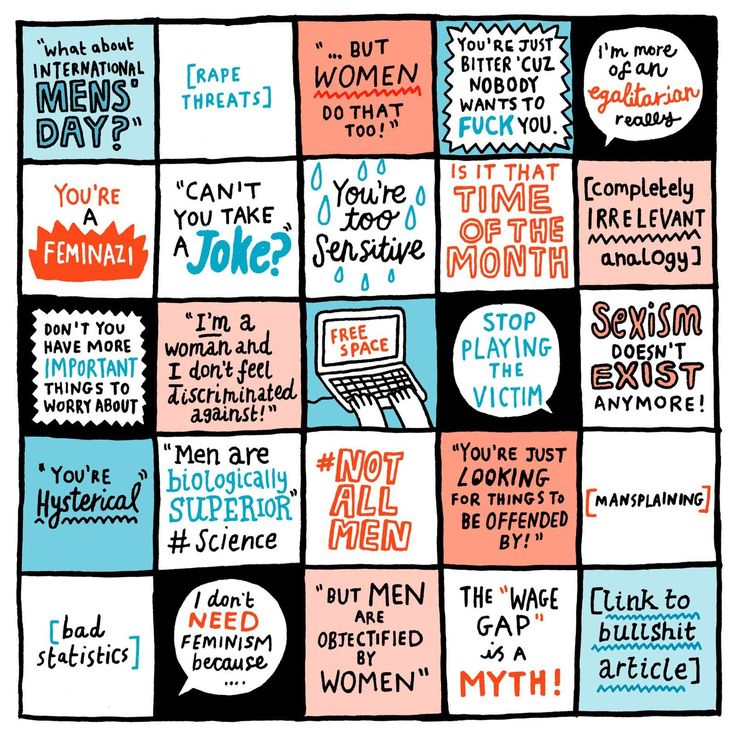 Consider giving yourself wind-down times. For example, 20 minutes with no devices. Instead, you could read a book or take a bath.
Consider giving yourself wind-down times. For example, 20 minutes with no devices. Instead, you could read a book or take a bath.
Avoiding potential triggers, like watching TV or scrolling the news on your phone, is key.
Creating a sleep routine will help you fall asleep faster and reduce the chances that you’ll lie awake, worrying about unfinished tasks or the next morning.
Humor
Just like thinking about something funny when you’re having an anxiety episode, working humor into your daily life can help you lower anxiety and stress, according to Sultanoff.
Consider these:
- Sign-up for joke newsletters.
- Read or watch cartoons.
- Watch sitcoms and funny videos.
- Hang out with people who make you laugh.
Hanging out with friends
“Relationships matter… even for us introverts,” says Stone. “Research also tells us that isolating is one of the worst things for anxiety and depression.”
So, consider making time for friends, family, and other social engagements.
“Put yourself in social situations at least weekly as a part of your self-discipline to help you build community over time,” says Stone.
Consider therapy
If you experience regular anxiety, it may be a good idea to consider therapy.
“Therapy can be an important ongoing part of a person’s life when they have jobs or relationship situations that bring chronic stress,” says Stone.
“A good therapist will be able to help you think through your options, establish boundaries, improve communication, practice emotional regulation and promote brain flexibility with [various therapeutic] approaches.”
What type of psychotherapy you choose is entirely up to you. You could consider setting up consultations with a few therapist to explore rapport and chemistry, for example.
Some of the therapy approaches you could consider include:
- cognitive behavioral therapy (CBT)
- dialectical behavioral therapy (DBT)
- internal family systems (IFS)
- emotional freedom therapy with tapping (EFT)
- eye movement desensitization reprocessing (EMDR)
- virtual reality exposure therapy
Sometimes, anxiety can be overwhelming and it could lead you to experience great distress. This is natural and not uncommon. A therapist can help you find more effective ways to manage these emotions.
This is natural and not uncommon. A therapist can help you find more effective ways to manage these emotions.
If your anxiety is persistent and intrusive, consider seeking the help of a professional. You can also check out our free anxiety quiz to find out whether what you’re experiencing might be something more.
If you’re feeling anxious, there are things you can do to help yourself calm down quickly. There are also lifestyle changes you can make that can help lower your stress levels and help you cope with potential triggers.
You might also find it helpful to talk to a therapist.
These resources might help:
- American Psychiatric Association’s Find a Psychiatrist tool
- American Psychological Association’s Find a Psychologist tool
- Asian Mental Health Collective’s therapist directory
- Association of Black Psychologists’ Find a Psychologist tool
- National Alliance on Mental Illness Helplines and Support Tools
- National Institute of Mental Health’s Helpline Directory
- National Queer and Trans Therapists of Color Network
- Inclusive Therapists
19 best quotes from Passengers (2016)
Passengers (2016)
Passengers
The action takes place in the future on a spaceship that transports colonists to a distant planet.
Similar films
Similar series
Creators
Video reviews
Quotes
Music006 Awards
Quotes from the movie Passengers (2016)
- 612 pathologies.
- What do they write there, what is the matter with me?
- So, nonsense.
Stop worrying about things you can't control. Just live.
Find someone who fills your heart and let him fill it.
This is not the kind of life we dreamed of. But this is our life.
Life
It's funny, we all have dreams. We imagine our future, we make plans, as if we are the captains of our destiny... But we are passengers, we fly and fate picks us up. This is not the kind of life we dream of, but this is our life.
Life
If you think about who you would like to be for a long time, you will miss the opportunity to live here and now.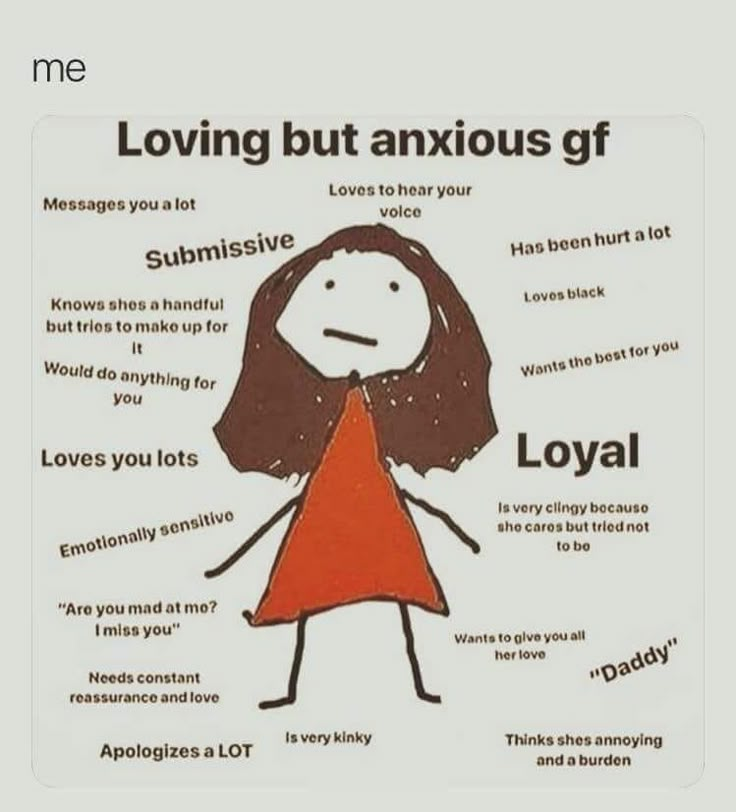
I don't think the universe is a villain, but it has a stupid sense of humor.
We need stories to know that we are not alone.
A drowning person always pulls someone along. It is not right. But he is drowning.
You find the woman of your dreams and she is so close, but completely out of reach.
dreams
I love getting to know you.
We start from scratch. In all senses.
When the bartender does nothing, people get nervous.
We have a problem. We shouldn't be here right now.
Don't yearn for your home, because "Native Abode" is waiting for you.
I am not only a bartender, I am a gentleman.
The message will be delivered in 19years. The answer will come in 55 years.
Who would want to sleep on such a beautiful day.
- I won't tell anyone.
Films with a twisted plot
TV shows about teenagers from nonflick
Dragons
Series about police
Films about Superman about hackers
Best new movies 2021-2022 released in good quality (1st - 2nd weeks)
8 NEW FILMS THAT ARE ALREADY OUT IN GOOD QUALITY in 2022!
Best New Movies 2020-2021, released in good quality (12-13th week)
10 New series of 2022 that have already been released in good quality
10 FILMS THAT WILL MARK ON YOUR SOUL
THE CHOICE OF WHICH YOU WILL NEVER DOUBT!
TOP 10 GREAT ROMANTIC FILMS!
10 Good Movies Based on True Events
stop worrying - Translation into Russian - examples English
Premium History Favorites
Advertising
Download for Windows It's free
Download our free app
Advertising
Advertising
No ads with Premium
English
Arabic German English Spanish French Hebrew Italian Japanese Dutch Polish Portuguese Romanian Russian Swedish Turkish Ukrainian Chinese
Russian
Synonyms Arabic German English Spanish French Hebrew Italian Japanese Dutch Polish Portuguese Romanian Russian Swedish Turkish Ukrainian Chinese Ukrainian
Conjugate this verb
Suggestions: stop worrying about to stop worrying
These examples may contain rude words based on your search.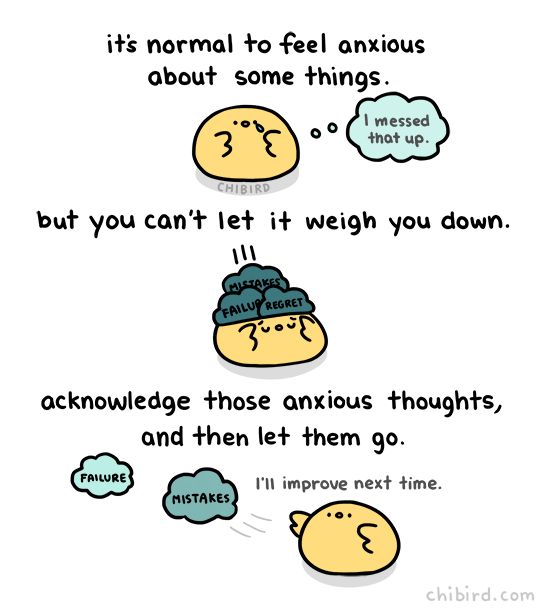
These examples may contain colloquial words based on your search.
stop worrying stop worrying stop worrying stop worrying don't worry
don't worry
stop worrying
stop worrying
don't worry
don't worry
stop being afraid
stop worrying
stop worrying
worry no more
stop worrying
Suggestions
670
323
I want you to know we can stop worrying .
I want you to know that we can stop worrying .
I think you should stop worrying .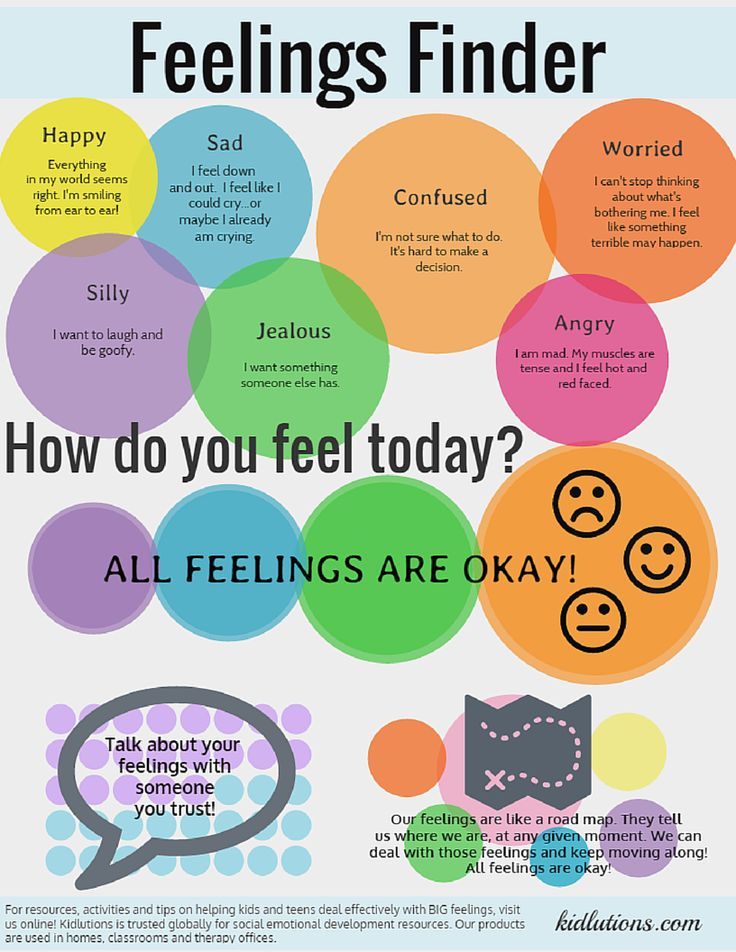
And I think you should stop worrying .
You can stop worrying , Doctor - we're through.
Can you stop worrying Doctor - we're through.
That's why you should try to relax more often and stop worrying all the time.
That's why you should try to relax and stop worrying all the time.
No, you can congratulate yourself and stop worrying .
No, you can congratulate yourself and stop worrying .
You should stop worrying , asking questions and doubting at any time.
You must stop worrying, asking questions and doubting at any moment.
If his tears stop immediately after you disappear from the field of vision, you can stop worrying - the adaptation was successful.
If his tears stop immediately after you disappear from view, you can stop worrying - adaptation was successful.
You can stop worrying now as there is a way to help you.
You can stop worrying now as there is a way to help you.
I finally decided I would stop worrying and just try my best.
I finally decided0227 stop worrying and just try everything on your own skin.
If you cannot stop worrying , then you should learn to find positive moments in your worrisome thoughts.
If you can't stop worrying then you must learn to find the positive in your anxious thoughts.
At least, if this is the only issue, you should certainly stop worrying , user Peter Flom smartly replied.
At the very least, if that's the only problem, you should definitely stop worrying ,” user Peter Flam replied slyly.
So stop worrying and let me spoil you.
So stop worrying and let me pamper you.
Even though it's your emotional default, stop worrying .
Even if this is your normal emotional state, Stop Worrying .
And once they test it in the morning, you'll have your funding, so stop worrying .
And as soon as they check it in the morning, you get funding, so stop worrying .
Look, the point is she can take care of herself, so stop worrying .
Look, she can take care of herself, so stop worrying .
Get yourself a drink, sit yourself down and stop worrying .
Pour yourself a drink, sit down and stop worrying .
Knowing how to cure dandruff, parents can stop worrying .
By knowing how to cure dandruff, parents can stop worrying .
If you are also concerned about your expenses, then you must stop worrying .
If you are also worried about your expenses, you should stop worrying .
If you can't stop worrying no matter what you try, seek professional help from a therapist, psychiatrist or physician.
If you cannot stop worrying no matter what you try, seek professional help from a psychotherapist, psychiatrist, or other physician.